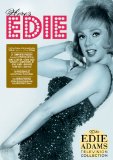| Reviews & Columns |
|
Reviews DVD TV on DVD Blu-ray 4K UHD International DVDs In Theaters Reviews by Studio Video Games Features Collector Series DVDs Easter Egg Database Interviews DVD Talk Radio Feature Articles Columns Anime Talk DVD Savant Horror DVDs The M.O.D. Squad Art House HD Talk Silent DVD
|
DVD Talk Forum |
|
|
| Resources |
|
DVD Price Search Customer Service #'s RCE Info Links |
|
Columns
|
|
|
Here's Edie: The Edie Adams Television Collection
The Collection
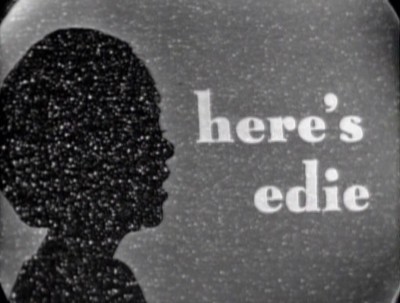
For many years, for many comedy fans like myself, Edie Adams (despite her notable acting roles in The Apartment and It's a Mad Mad Mad Mad World) has been known primarily as Mrs. Ernie Kovacs. After Kovacs's tragic death, she became determined to collect the tapes of his shows and preserve them, to preserve his legacy as one of the most ingenious innovators in TV comedy, culminating in a few recent box sets from Shout! Factory and the 50-years-belated release of Kovacs's comedy album, Percy Dovetonsils... Thpeaks. What most of us didn't know is that right after her husband's death in 1962, Edie Adams had such a financial burden in her new role as her family's breadwinner, saddled with Ernie's debts as she was, that she was forced into a career overdrive that eventually led to her creating a line of cosmetics and a chain of beauty salons.
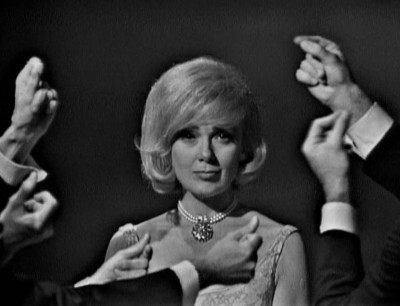
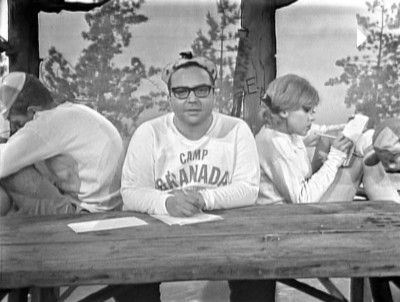
One of the most immediate products of her new work regimen was a variety show that ran from 1962-64, first known as Here's Edie and retitled The Edie Adams Show in its second season. It highlighted Adams's singing and numerous other musical acts, but from episode to episode, there might be a comedy sketch by Rowan and Martin or a dramatic Shakespeare reading by Michael Redgrave or a mock-Kabuki staging of "Casey at the Bat" with L.A. Dodger Maury Wills. Edie might just have a TV crew set up and grab footage of her current Las Vegas stage show. While variety was a pretty common concept for a show of the era, the casual eclecticism and sometimes jawdroppingly ambitious execution of the shows presented in the Here's Edie box set reveals that Adams was as much a TV genius as her husband.
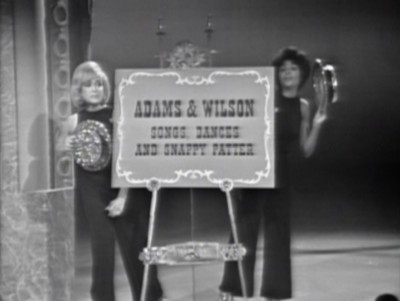
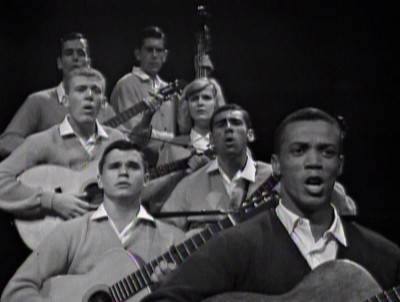
The earliest episodes of the Here's Edie season are the most exciting. These episodes have Edie partnering with producer-director Barry Shear, who had worked on a few Ernie Kovacs projects and went on to do some Man From U.N.C.L.E. episodes and low-budget features like Wild in the Streets and Across 110th Street. Like Kovacs, Shear seems game to mess with the form of TV. In one segment of the New York-themed episode, Edie sings a romantic ballad and, as she bows, there is a hard match-cut to her performing a ('60s TV-appropriate) striptease, intercut with still photos of burlesque audiences shot by famed photojournalist Weegee. In another, Shear subverts the idea of being a singer on TV by showing Edie daydreaming in a subway car set, while a pre-recorded performance of "Lonely Town" plays. There is an episode shot almost entirely on location in London, full of technically challenging shots (like a crane shot of post-WWII buildings left in rubble) that would have been difficult for a film crew, let alone technicians using the bulky TV cameras of this era. Even when doing segments with zero ambition, that just involve Edie or one of the other musical guests singing, Shear has an eye for framing the performance in unusual and striking ways.
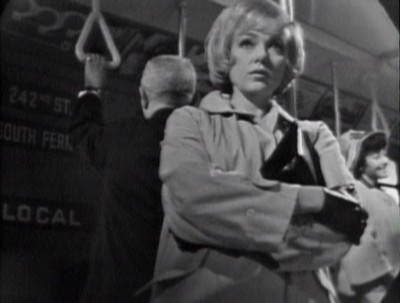
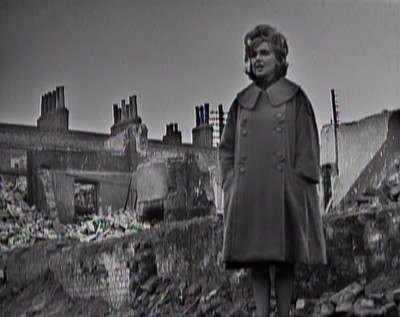
It's a bit of a letdown then that Shear leaves the show shortly before the end of the first season. The bulk of the seemingly higher-budgeted second season is directed by Joe Behar, who also previously worked with Kovacs but who is far less experimental than his predecessor. Eventually, Gordon Wiles takes the reins and shows the same affinity for blackout sketches that Kovacs did, also prefiguring Wiles's upcoming work as director of Rowan and Martin's Laugh In. Over the course of 21 half-hour episodes, you get a sense of the show gradually changing from an odd little artistic endeavor to what Steve Martin used to mock in his stand-up as "professional show business."
The show is not damaged greatly by these changes in approach behind the camera, thanks to the consistent likability of its creator and star, Edie Adams. On screen, Edie's impressive vocal range, sultry charm, and infectious good humor keeps the show afloat, especially during some of the dopier comedy sketches which start to crop up in greater numbers as the series goes on. Off screen, she had the good sense to design the show in a way that keeps it from settling into a stale pattern. When you start watching an episode, you don't know how many song segments, guest segments, comedy sketches, or dramatic interludes you're going to get. There are only two guarantees: the show will end with Edie saying, "Thank you. Goodnight." and there are going to be ads for Muriel Cigars.
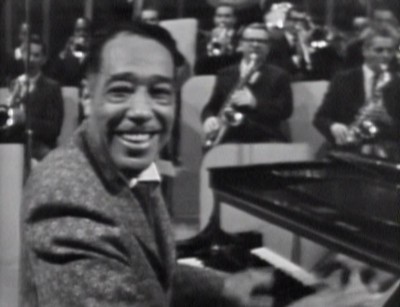
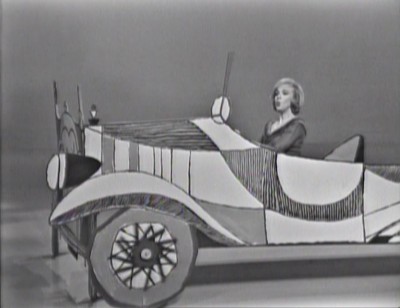
Edie's late husband was known to shill for Dutch Masters Cigars, often directing commercials for the brand as strange and innovative as his comedy show. Edie (despite being asthmatic) became synonymous for another cigar produced by the same corporation. With the memorable come-on of a catchphrase, "Why don't you pick one up and smoke it sometime?," Edie helped quadruple Muriel's sales and she remained their spokeswoman for decades. The episodes included in this set are shown with the original commercials, which are a treat to watch. (There are only a handful of different commercials, however, so they can get a bit repetitive if you watch the box set straight through.) Edie Adams's show used to alternate weeks with The Sid Caesar Show and a few of Sid's very funny Dutch Masters commercials pop up in some of the episodes too.
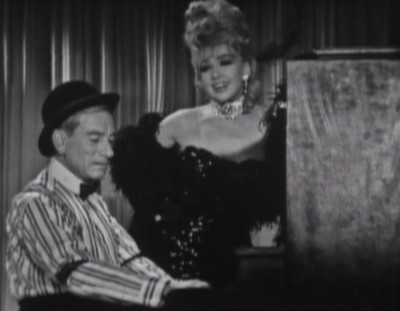
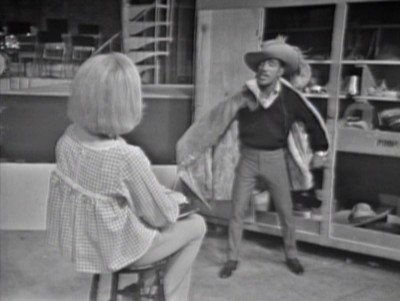
As I said, the show is music-heavy, and the genres featured lean heavily toward jazz, showtunes, and orchestral pop. There are a couple of folk numbers, including one performed by Edie's stepdaughter. Rock and Roll is mocked in the pilot episode by The Producers' Dick Shawn and almost makes a straight-faced appearance on the program during Bobby Darin's appearance, but just barely. Pretty much all of the musical performances are outstanding, and a majority of it appears to be captured live -- one noticeable exception being when Count Basie's drummer is shown in close-up and very clearly fails to match the entrance of the pre-recorded drum track.
The line-up of musical guests mixes some musical giants with more obscure curiosities; in alphabetical order, they are: Laurindo Almeida, Charlie Barnet, Charlie Byrd, Hoagy Carmichael, Claremont String Quartet, Count Basie and his band, Bobby Darin, Sammy Davis Jr. (he also gets in some nice hoofing during his appearance), The Eligibles, Duke Ellington and his orchestra, Jerry Fielding and his orchestra, Eddie Fisher (who was dating Edie at the time of his appearance), Pete Fountain, Stan Getz (twice), Grenadier Guards, Lionel Hampton and his orchestra, Jon Hendricks of Lambert, Hendricks, and Ross, Woody Herman and his band, Al Hirt, Spike Jones and his band, Johnny Mathis, Lauritz Melchior, Piccadilly Buskers, Andre Previn (twice), Bonnie's dad John Raitt, Eddie Sauter and the Philharmonic Strings, Dick Shawn, Jack Sheldon, Allan Sherman of "Hello Muddah, Hello Faddah" fame, the Third Air Force Band, The United Nations Children's Choir (three times!), the Roger Wagner Chorale, L.A. Dodger and apparent folk singer Maury Wills, and Nancy Wilson.
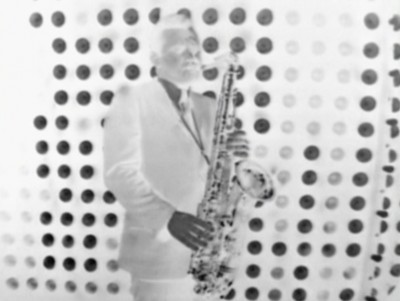
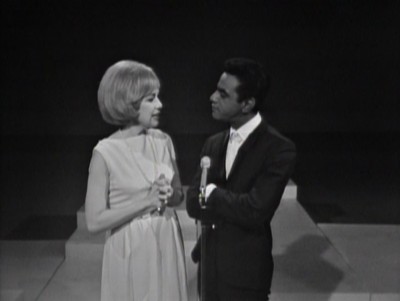
In the early episodes, there are a pair of dramatic interludes: Peter Falk does a monologue on a New York street as a cabbie and Sir Michael Redgrave performs the "St. Crispin's Day" speech from Henry V on a bridge overlooking the Thames. Don Rickles and Cesar Romero make wordless cameos in an episode. Eventually, though, all the non-musical guests on the show are there for comedy's sake: Bob Hope, Rowan & Martin, Buddy Hackett, Zsa Zsa Gabor, Soupy Sales, Terry-Thomas, Cliff Norton, Alan Sues, Louis Nye, Mitzi McCall & Charlie Brill (who performed on Ed Sullivan the night of The Beatles' debut), and a trio of semi-regulars who helped out in a number of the show's sketches: frequent Stephen Sondheim scriptwriter George Furth, TV journeyman Don Chastain, and Peter Hanley, who used to work for Kovacs.
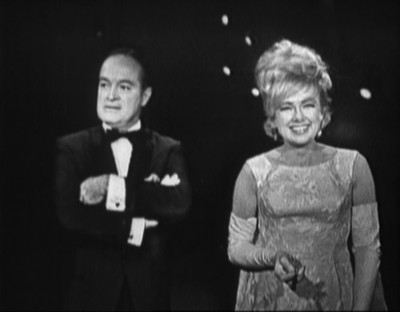
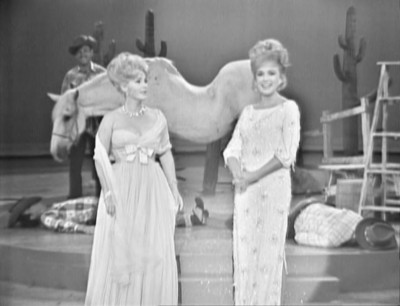
The DVDs
The 21 episodes are presented on 4 DVDs, packaged in one sturdy, thick case, with a disc attached to the front and back, and on a back-to-back tray in the middle. Inside is an attractive booklet with photos, program notes, testimonial quotes about Edie from numerous celebrities, and an informative essay by Adams's son, Josh Mills.
The Video & Audio:
The A/V quality is the only drawback about this outstanding collection, but considering the rarity of the material, it's obviously the best one could hope for. The black-and-white 1.33:1 images are taken mostly from the original source tapes, although a few episodes with film scratches and specks have obviously been pulled from kinescopes. There are picture flaws native to the 1960's video format: lack of detail in wide shots, blown-out highlights, and an overall flatness. Plus, there are also problems due to the master tapes aging, like occasional lines, video dropouts, and general blurriness. The mono audio also varies from fairly clear to noisy and hissy from show to show, and sometimes from segment to segment. The kinescope episodes, by their second-generation nature, are the most underwhelming soundwise.
All of these flaws are noticeable, but I would argue they rarely distract from the enjoyment of the programs overall. This is nostalgia-baiting, time-capsule material, after all, and it would probably be more shocking to viewers if it somehow resembled a modern HDTV presentation.
Special Features:
The bonuses are spread across three of the four discs.
There are 19 bonus song performances from different Ernie Kovacs TV shows, many of which can be found within those Ernie Kovacs box sets mentioned at the top of this review, but a good chunk are exclusive to this release at this time. Whether you've seen them before or not, they are well worth checking out. Two highlights include Edie impersonating Marilyn Monroe singing "The Ballad of Davy Crockett" and a mock-Busby Berkeley number set to a medley of "Lullaby of Broadway" and "42nd Street."
The United Nations Children's Choir was obviously a sentimental audience favorite because they appeared on the show three different times. An outtake of the children and Edie performing "Do Re Mi" from The Sound of Music is the sole deleted moment from the series included in the extras.
There are a pair of brief Sid Caesar and Edie Adams promos, underlining the fact that their shows shared a time slot and alternated each week.
And finally, a Muriel promotional film from 1965 presents highlights of Edie on a promotional trip to Memphis, then recording a Muriel-sponsored album, and inevitably offering cigars to Santa Claus on the streets of Rome, where she was shooting the Rex Harrison film The Honey Pot.
Final Thoughts:
For pop culture addicts, TV historians, '60s jazz fans, and devoted cigar smokers, this is a must-own. DVD Talk Collector Series!
Justin Remer is a frequent wearer of beards. His new album of experimental ambient music, Joyce, is available on Bandcamp, Spotify, Apple, and wherever else fine music is enjoyed. He directed a folk-rock documentary called Making Lovers & Dollars, which is now streaming. He also can found be found online reading short stories and rambling about pop music.
|
| Popular Reviews |
| Sponsored Links |
|
|
| Sponsored Links |
|
|
| Release List | Reviews | Shop | Newsletter | Forum | DVD Giveaways | Blu-Ray | Advertise |
|
Copyright 2024 DVDTalk.com All Rights Reserved. Legal Info, Privacy Policy, Terms of Use,
Manage Preferences,
Your Privacy Choices | |||||||









